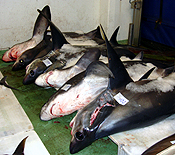Atlantic Tuna Body Extends Management Disgrace to Sharks
Conservationists decry failure to protect even the most threatened species
 © Dave Kulka
© Dave Kulka
ICCAT took the smallest possible step by mandating the release of bigeye threshers only if the animals are still alive, a measure of little consequence given the lack of at-sea monitoring. Bigeye Threshers at Vigo Fish Market.
The Shark Alliance is denouncing the failure of international fishery managers to adopt meaningful limits on the catch of threatened Atlantic sharks at their annual meeting which ended today.
Despite unprecedented scientific warnings about the vulnerability of sharks and multiple proposals for shark fishing limits from member governments, Parties to the International Commission for the Conservation of Atlantic Tunas (ICCAT) emerged from their week-long negotiations with agreements for only minimal actions for sharks.
“The bad habits associated with ICCAT’s notoriously poor bluefin tuna management are hurting oceanic sharks as well,” said Sonja Fordham, Shark Alliance Policy Director.
“The chronic failure to act on scientific advice and take precautionary action in the face of uncertainty spells disaster for sharks, most of which are more vulnerable to overfishing than the fish under ICCAT limits.
As is the case for bluefin tuna, conservationists will look to global wildlife conservation bodies and unilateral action to provide interim safeguards for the oceanic shark populations neglected by ICCAT.”
ICCAT Parties received new scientific advice on eleven species of oceanic sharks, which are taken without limit in international waters. The analyses show that most of these species grow very slowly and, as such, can be overfished even at very low fishing levels.
Scientists asked ICCAT to consider prohibiting the retention of the most vulnerable shark species, in particular, the exceptionally slow growing bigeye thresher.
Proposals from the European Community (EC) and Brazil to prohibit take of threshers received support from the United States, Uruguay and South Africa, but were harpooned by Japan and China. EC proposals to protect hammerhead sharks and limit catch of blue and shortfin mako sharks were withdrawn because of opposition.
In the end, ICCAT took the smallest possible step by mandating the release of bigeye threshers only if the animals are still alive, a measure of little consequence given the lack of at-sea monitoring.
There were no attempts to protect porbeagle sharks, despite ample evidence of severe depletion and new threats in the North Atlantic. Parties instead agreed to convene consecutive scientific and international policy meetings on porbeagle in 2009.
EU scientists have recommended a ban on taking porbeagle from the Northeast Atlantic while Canadian scientists estimate that a new, international porbeagle fishery will crash the Northwest Atlantic population. Canadian officials had previously argued that ICCAT was the fisheries body responsible limiting international catch of porbeagle, but did not offer a proposal to do so.
Parties discussed problems with ICCAT’s ban on finning (slicing off a shark’s fins and discarding the body at sea), which is implemented through a complicated fin-to-carcass weight ratio. Problems arise when vessels from the EC, which uses the world’s highest ratio, land shark fins in other countries with more stringent rules, such as South Africa. Instead of lowering the ICCAT ratio and thereby strengthening the finning ban, Parties asked their scientific committee to analyze fin to carcass ratios for a second time.
“Most scientists agree that the only fail-safe method to end finning is to require that sharks be landed with their fins attached,” said Sandrine Polti, Fisheries Policy Advisor for the Shark Alliance. “This week’s inaction leaves the ICCAT finning ban as the only international measure to curb mortality of Atlantic oceanic sharks. It is therefore imperative that it be strictly enforced. The EU should tighten its finning ban immediately and then work to export those improvements to ICCAT next year.”
Over the next year, the Shark Alliance and its member groups will be working for the following stop-gap measures for the highly migratory, oceanic sharks that ICCAT has failed:
- Listings for porbeagle and mako sharks under the Convention on Migratory Species (CMS);
- An end to fisheries for North Atlantic porbeagle sharks, including an EU catch limit of zero;
- EU limits on species proposed for ICCAT action by the EC (mako, blue, hammerhead and thresher);
- Listings for porbeagle and other internationally traded, depleted sharks under the Convention on International Trade in Endangered Species (CITES); and
- A stronger EU ban on finning.
For more information, media interviews or B roll:
Sophie Hulme, +44 (0) 7973 712 869
[email protected]
Notes to editors:
The Shark Alliance is a coalition of 61 conservation, scientific, and recreational organizations dedicated to improving European shark fishing policies.
ICCAT is responsible for the conservation of tunas and tuna-like species in the Atlantic and adjacent seas. Currently, ICCAT has 46 Contracting Parties including the European Union.
Most sharks grow slowly, mature late, and produce a small number of young and are therefore more susceptible to overexploitation and depletion than other species taken in ICCAT fisheries.
Several species of oceanic sharks, particularly porbeagles and makos, are prized for their meat and fins and, as such, are targeted and often retained when taken incidentally. ICCAT requires the reporting of shark catches, but many countries are not complying.
Because of poor catch information, the population status of blue and shortfin mako sharks is uncertain, although some analyses for North Atlantic shortfin makos estimate depletion at 50% or more since the ’50s.
In June 2007, an EU proposal to list porbeagle sharks under the Convention on International Trade in Endangered Species (CITES) was defeated with arguments that regional fisheries organizations such as ICCAT are the appropriate bodies for international shark management.
In November 2007, ICCAT Parties, except for Canada, agreed to reduce fishing pressure on North Atlantic shortfin makos and porbeagle sharks, but stopped short of setting any specific restrictions on fishing these species.






